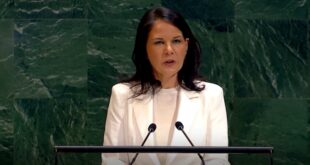Chancellor Angela Merkel and Bavarian conservative leader Horst Seehofer have reached a deal on migrant policy that could save the governing coalition. But will the Social Democrats accept the deal? Jefferson Chase/DW reports from Berlin.
After plenty of political twists and turns over the past few days and weeks, Chancellor Angela Merkel has achieved a last-ditch agreement to end the dispute between her conservative Christian Democrats (CDU) and their Bavarian sister party, the Christian Social Union (CSU).
Following a final crisis meeting on Monday, after interior minister and CSU chairman Horst Seehofer tendered his provisional resignation late Sunday evening, Merkel and the Bavarian achieved a breakthrough.
Merkel said Germany would be putting in place national “transit centres” to “order and steer secondary migration” — the movement of migrants within the EU. The chancellor said the deal would balance national and international approaches to the issue of how to control migration.
“As such the spirit of partnership in the European Union is preserved, and at the same time it’s an important step to order and control secondary migration,” she told reporters. “We have found a good compromise after tough negotiations and difficult days.”
Seehofer, who confirmed he would be staying on as interior minister, said he was “very satisfied” with the “clear deal” reached by Germany’s two conservative parties to “stem illegal migration.” He added that the transit centres would help speed up asylum decisions and, in negative cases, accelerate deportations.
The general secretaries of the two parties said the agreement would reduce migration to Germany and allow the country to turn away people who have no chance of being granted asylum in the country quickly.
The deal seems to have buried the issue of whether Germany would have the authority to turn away migrants at its national borders, a main point of disagreement between conservatives that had threatened to break apart the long-standing CDU-CSU parliamentary bloc.
Simmering conflict
The agreement ends a feud that had been building for some time. Seehofer has been critical of the chancellor’s welcoming policy toward migrants since late 2015, when Merkel decided not to order people turned back at Germany’s borders.
That animosity was further compounded in March of this year, when Seehofer became Germany’s interior minister while retaining the CSU chairmanship. Exacerbating the situation was the fact that Bavaria holds regional elections in October. In order to retain its absolute majority, the CSU is anxious to present a hard line on migrants and head off competition from the right-wing populist Alternative for Germany (AfD) party.
The centrepiece of Seehofer’s tenure as interior minister was to be his “master plan” for migration. But Merkel took exception to one of its 63 provisions, which called for Germany to reject migrants registered in other EU countries at its national borders. Merkel has repeatedly stated her preference for European solutions to migration issues.
Seehofer was unwilling to accept any amendments and repeatedly postponed his presentation of the document. Instead, he threatened to use his authority as interior minister to institute national border checks despite Merkel’s opposition, precipitating the crisis in Merkel’s governing coalition.
What will the SPD do?
But there’s a third player in this equation. On Monday, as Merkel was meeting with her CSU counterpart, Social Democratic Party (SPD) chairwoman Andrea Nahles said the SPD would only be guided by its coalition agreement with the CDU-CSU, not by Seehofer’s master plan.
After negotiating their deal late on Monday, Merkel and Seehofer discussed the arrangement with the SPD at a coalition committee meeting. Talks broke off early Tuesday, with Nahles saying many issues still needed to be clarified before the SPD could approve the deal.
“We’ll take the time we need to come to a decision,” said Nahles. Coalition committee talks are expected to continue at the chancellery on Tuesday evening.
The Social Democrats have released a five-point plan spelling out what they want to see happen on the migrant issue. That document calls for
- more to be done to combat the reasons why people flee their home countries
- no unilateral action to turn people away at national borders within the EU
- more help for Italy and Greece, the two EU countries where migrants crossing the Mediterranean most frequently end up
- tighter controls of the EU’s external borders
- a comprehensive German law governing immigration to the country and the German job market.
It remains to be seen whether the Social Democrats will go along with the CDU and CSU’s arrangement. Until the SPD gives the thumbs-up, Merkel’s government isn’t completely out of the woods.
© DW
 THE AFRICAN COURIER. Reporting Africa and its Diaspora! The African Courier is an international magazine published in Germany to report on Africa and the Diaspora African experience. The first issue of the bimonthly magazine appeared on the newsstands on 15 February 1998. The African Courier is a communication forum for European-African political, economic and cultural exchanges, and a voice for Africa in Europe.
THE AFRICAN COURIER. Reporting Africa and its Diaspora! The African Courier is an international magazine published in Germany to report on Africa and the Diaspora African experience. The first issue of the bimonthly magazine appeared on the newsstands on 15 February 1998. The African Courier is a communication forum for European-African political, economic and cultural exchanges, and a voice for Africa in Europe.



















